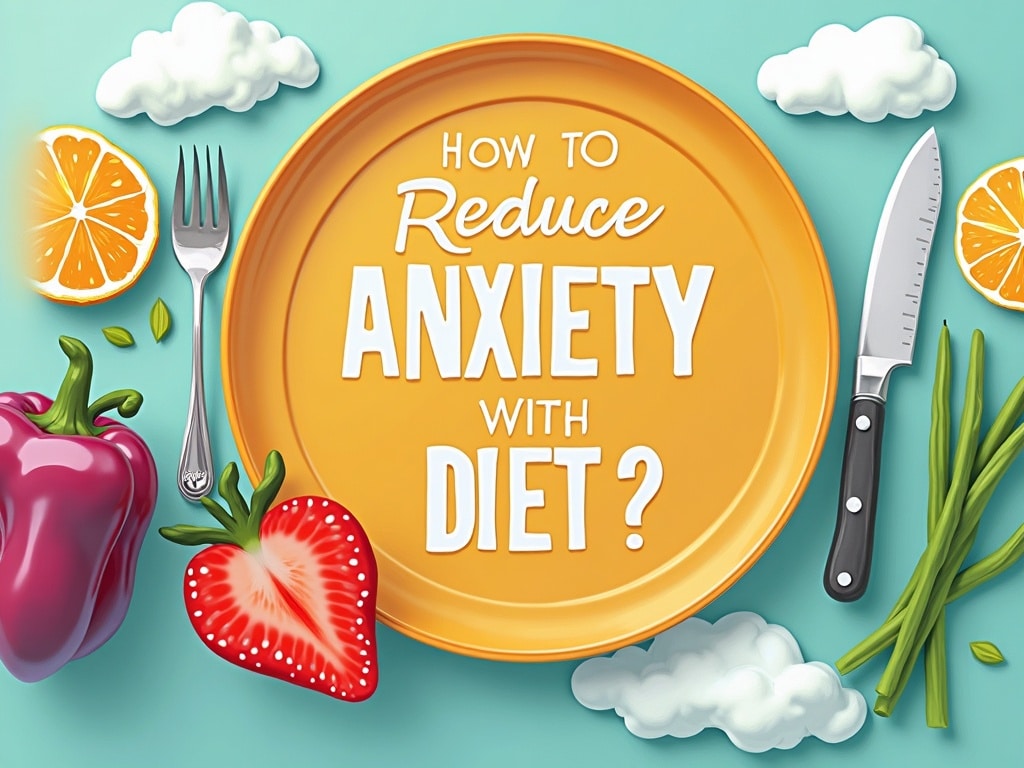How to Reduce Anxiety with Diet: A Comprehensive Guide
Do you ever find yourself caught in a whirlwind of anxious thoughts, your stomach churning with unease? While therapy and lifestyle adjustments are crucial, what if I told you that your diet could be a powerful ally in the fight against anxiety? It's true. The food we consume profoundly impacts our brain chemistry and overall well-being. This guide dives deep into the world of nutritional psychiatry, offering actionable strategies to calm your mind through conscious eating.
The Gut-Brain Connection: A Two-Way Street
For years, we've understood that the brain influences the gut. Think of the butterflies you feel before a big presentation – your brain signaling distress to your digestive system. But the reverse is equally significant: your gut health dramatically affects your brain. This intricate communication network, known as the gut-brain axis, is a key player in regulating mood, stress response, and yes, anxiety.
The gut microbiome, the trillions of bacteria residing in your intestines, plays a crucial role in this connection. These bacteria produce neurotransmitters like serotonin (the happy hormone) and GABA (a calming agent). An imbalance in gut bacteria, often caused by a poor diet, can disrupt neurotransmitter production and exacerbate anxiety symptoms.
Foods to Embrace: Your Anti-Anxiety Arsenal
What should you be eating to soothe your anxious mind? Focus on incorporating these nutrient-rich foods into your daily routine:
1. Fatty Fish: Omega-3 Powerhouses
Salmon, mackerel, sardines, and other fatty fish are brimming with omega-3 fatty acids. These essential fats are vital for brain health, reducing inflammation and supporting neurotransmitter function. Studies have shown a link between omega-3 intake and reduced anxiety symptoms. Aim for at least two servings of fatty fish per week.
2. Probiotic-Rich Foods: Cultivating Calm from Within
Yogurt (especially Greek yogurt with live and active cultures), kefir, sauerkraut, kimchi, and kombucha are teeming with probiotics – beneficial bacteria that can rebalance your gut microbiome. A healthy gut microbiome contributes to the production of mood-boosting neurotransmitters, potentially alleviating anxiety.
3. Magnesium-Rich Foods: The Relaxation Mineral
Magnesium is a mineral crucial for hundreds of bodily functions, including nerve and muscle relaxation. Many people are deficient in magnesium, which can contribute to anxiety and stress. Load up on these magnesium-rich foods:
- Dark leafy greens (spinach, kale, collard greens)
- Nuts and seeds (almonds, cashews, pumpkin seeds)
- Avocados
- Dark chocolate (yes, you read that right!)
- Legumes (black beans, kidney beans)
4. Zinc-Rich Foods: Brain Function Support
Zinc is another essential mineral that plays a role in brain function and mood regulation. Deficiencies in zinc have been linked to anxiety and depression. Good sources of zinc include:
- Oysters
- Beef
- Pumpkin seeds
- Cashews
- Chickpeas
5. Complex Carbohydrates: Stable Energy, Stable Mood
Unlike simple carbohydrates (sugary snacks and processed foods), complex carbohydrates provide a slow and steady release of energy, preventing blood sugar spikes and crashes that can trigger anxiety. Opt for these complex carbohydrate sources:
- Oats
- Quinoa
- Brown rice
- Sweet potatoes
- Whole-grain bread
6. Foods Rich in Antioxidants: Protecting Your Brain from Stress
Antioxidants protect your brain cells from damage caused by free radicals, which are unstable molecules that contribute to inflammation and stress. Berries (blueberries, strawberries, raspberries), dark chocolate, and colorful vegetables like bell peppers and broccoli are excellent sources of antioxidants.

Foods to Limit or Avoid: Anxiety Triggers
Just as some foods can help reduce anxiety, others can exacerbate it. Be mindful of these potential culprits:
1. Processed Foods: Empty Calories, Empty Mood
Processed foods are often high in sugar, unhealthy fats, and artificial additives, while being low in essential nutrients. They can disrupt blood sugar levels, fuel inflammation, and negatively impact gut health, all of which can worsen anxiety.
2. Sugary Drinks and Snacks: The Blood Sugar Rollercoaster
Similar to processed foods, sugary drinks and snacks cause rapid spikes and crashes in blood sugar, leading to energy fluctuations and mood swings that can trigger anxiety.
3. Excessive Caffeine: Jitters and Anxiety Amplification
While a moderate amount of caffeine can provide a temporary energy boost, excessive caffeine intake can lead to jitters, nervousness, and increased anxiety. Be mindful of your caffeine consumption, and consider switching to decaffeinated alternatives.
4. Alcohol: A Temporary Escape, a Long-Term Problem
Alcohol may provide a temporary feeling of relaxation, but it can disrupt sleep, deplete essential nutrients, and worsen anxiety symptoms in the long run.
5. Artificial Sweeteners: Gut Disruptors
Some studies suggest that artificial sweeteners can negatively impact the gut microbiome, potentially contributing to anxiety. More research is needed, but it's wise to be mindful of your consumption of artificial sweeteners.
Building Your Anti-Anxiety Diet: Practical Tips
Ready to transform your diet into a powerful tool for anxiety management? Here are some practical tips to get you started:
1. Start Small and Gradual:
Don't try to overhaul your entire diet overnight. Begin by making small, sustainable changes, such as adding one serving of fatty fish to your weekly menu or swapping sugary drinks for water.
2. Plan Your Meals and Snacks:
Planning ahead can help you make healthier choices and avoid impulsive decisions driven by cravings or stress.
3. Read Food Labels Carefully:
Pay attention to ingredient lists and nutritional information to make informed choices about the foods you're consuming.
4. Cook at Home More Often:
Cooking at home allows you to control the ingredients and portion sizes, ensuring you're nourishing your body with wholesome foods.
5. Listen to Your Body:
Pay attention to how different foods affect your mood and energy levels. Keep a food journal to track your experiences and identify potential triggers.
6. Stay Hydrated:
Dehydration can worsen anxiety symptoms. Aim to drink plenty of water throughout the day.
7. Combine Diet with Other Strategies:
Remember that diet is just one piece of the anxiety management puzzle. Combine it with other strategies such as therapy, exercise, mindfulness, and adequate sleep for optimal results.
Beyond Food: Lifestyle Factors that Complement Your Diet
While diet plays a crucial role, it’s important to remember it's not a standalone solution. These lifestyle factors can significantly enhance the positive effects of a healthy diet on your anxiety levels:
- Regular Exercise: Physical activity is a natural stress reliever. Aim for at least 30 minutes of moderate-intensity exercise most days of the week.
- Sufficient Sleep: Lack of sleep can exacerbate anxiety symptoms. Prioritize getting 7-8 hours of quality sleep each night.
- Mindfulness and Meditation: Practicing mindfulness and meditation can help you become more aware of your thoughts and feelings, allowing you to manage anxiety more effectively.
- Stress Management Techniques: Identify your stressors and develop healthy coping mechanisms, such as deep breathing exercises, yoga, or spending time in nature.
- Social Support: Connecting with loved ones and building a strong social support network can provide emotional support and reduce feelings of isolation.
The Takeaway: Nourish Your Mind, Calm Your Anxiety
Reducing anxiety with diet is about more than just restricting certain foods. It's about nourishing your body and mind with wholesome, nutrient-rich foods that support brain health and promote a balanced gut microbiome. By incorporating the strategies outlined in this guide, you can take control of your anxiety and cultivate a calmer, more resilient you. Remember, it's a journey, not a destination. Be patient with yourself, celebrate small victories, and seek professional guidance if needed. Your mental well-being is worth the investment.

